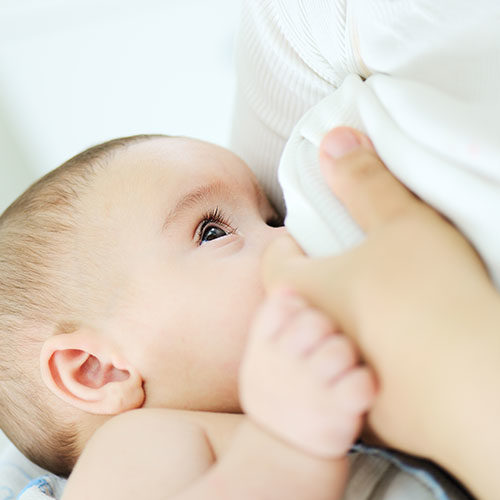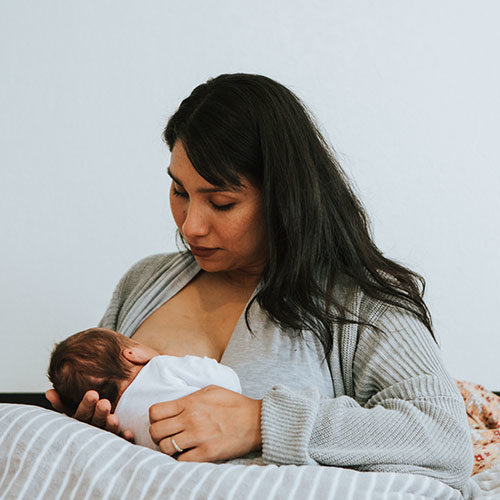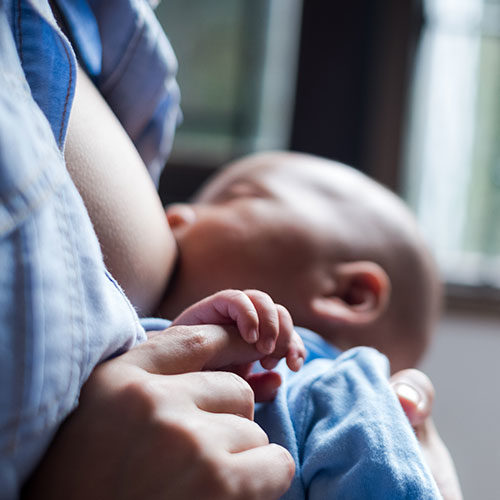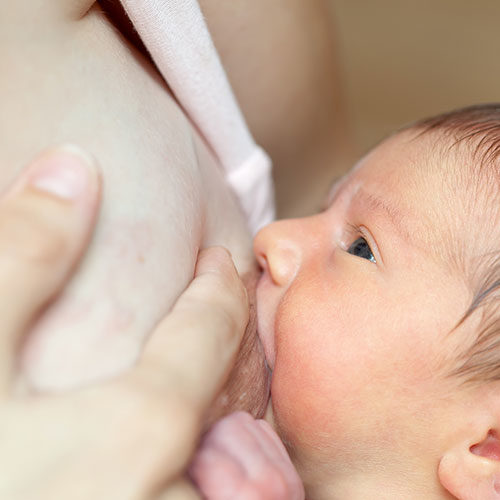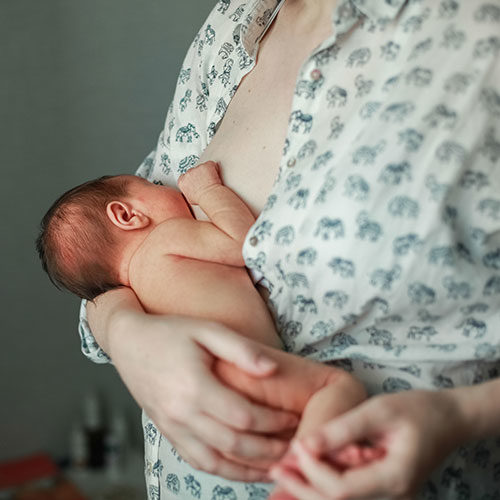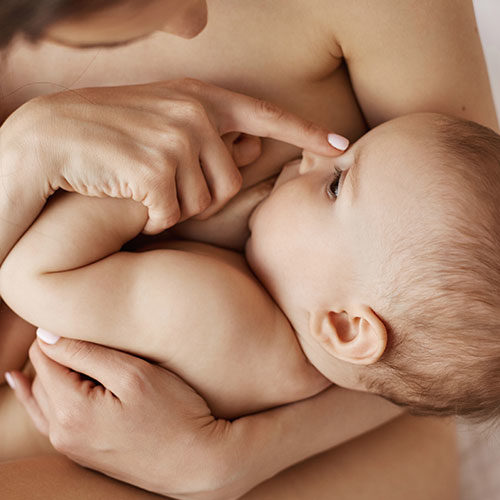Why are my Nipples Sore and cracked? How can I cure it?
Breastfeeding, for a first time new mother, may take a little while to get used to. For some women, breastfeeding causes a little discomfort in the beginning. In most cases, this is just a physical response toward trying something new. It settles in a couple of days. For some women, the initial process of latching the baby on could be mildly painful. This pain is mild, transient and disappears within a few seconds. The rest of the nursing session is painless. In the above-described scenarios, mild discomfort and mild pain do not need any treatment. It settles on its own within a few days.
When is professional help needed?
In the following scenarios, it is important to seek help either through online resources or by seeing a professional.
- The pain is moderate to severe.
- The pain doesn’t disappear after latching but lasts through the entire nursing session.
- There is a pain in between nursing sessions as well.
- Nipple looks different before and after nursing. Nipples may look pinched, flattened, red, show skin damage and cracks.
In most cases, sore nipples are a result of poor latching. When a baby latches only on the nipple, or with very less part of areola in the mouth, it creates a shallow latch. A shallow latch does not yield milk from the breast and as a result the baby gets frustrated. In order to get the milk, the baby then bites or chews the nipple. This is of course painful. When a shallow latch continues for 2-3 or more feeds, the mother starts to get sore nipples. And when the latch is not corrected, these sore nipples can develop cracks. And these cracks might bleed during breastfeeding. However, it is completely safe for the baby to receive the milk from sore/cracked/bleeding nipples.
Common causes and remedies:
Cause– Poor latch or attachment
A shallow latch is a prime reason for sore nipples for most breastfeeding mothers.
Remedies–
- Learn the correct latching steps and techniques.
- Attain a deep latch with a maximum part of areola in the baby’s mouth.
- When the baby latches poorly, unlatch and latch again. Don’t continue nursing in pain just to avoid interrupting the baby.
More information in our article on ‘Deep Latch’.
Cause– Wrong positioning
When the baby is positioned in an uncomfortable manner, or if the mother is poorly supported and in an uncomfortable position while nursing, sore nipples can occur.
Remedies –
- Position the baby correctly in terms of head-back-hip alignment etc.
- Support the baby well.
- Make sure the baby is comfortable.
- Make sure the mother is comfortable.
More information in our article on ‘Positioning’.
Cause– Tongue ties
Tongue ties can potentially inhibit a deep latch.
Remedies-
- See a lactation professional to assess tongue ties, if any.
- Don’t defer to get rid of a tie which is coming in the way of breastfeeding.
Cause– Engorgement
It is difficult for a baby to attain a deep latch on an engorged breast.
Remedies-
- Hand expressing before nursing can make the breast softer and easier for the baby to latch on.
- Reverse pressure softening can be useful.
- More information in our article on ‘Engorgement’.
Cause– Unusually strong Suckling
Baby suckles unusually vigorously if the baby is extremely hungry by the time breast is offered.
Remedies-
1. Feed at early hunger cues – Following are the hunger cues that babies display in this order.
- looking here and there
- rooting, smacking lips
- making sounds
- bringing hands/fists to mouth
- crying
2. Do not wait until the baby cries.
Cause – Conditions like eczema, psoriasis etc.
Remedies-
- Right diagnosis, treatment and medication is required.
- Don’t forget to ask for breastfeeding friendly medication.
Cause– Infections like thrush
Remedies-
- Correct diagnosis and treatment are required.
- The medication is for the mother and the baby both as the infection can be passed on from the mother to the baby and vice versa.
Cause- Oversupply / forceful letdown
A mother with an oversupply of breast milk likely has an overactive or forceful letdown. The baby clamps onto the nipple to control this fast flow of the milk which she is unable to handle. This clamping can lead to sore nipples
Remedies-
- Oversupply can be addressed by –
- Altering positions and enabling the baby not to be bothered by the fast flow of the milk.
- Bringing the supply down carefully and gradually. More information in our article on ‘Oversupply’.
Cause-
Low supply
A mother having legitimate low supply can also face sore nipples as the baby struggles to get milk at the breast. The baby bites and chews out of frustration leading to sore and cracked nipples.
Remedies –
Low supply is dealt with by-
- Increasing milk supply by stimulating the breasts more
- Homemade supplemental nursing system (SNS)
- Consuming lactation inducing foods and/or prescribed galactagogues.
- More information on increasing supply is found in our article on ‘Weaning off formula’.
Cause– Incorrect flange size for pumping mothers
Remedies –
- Measure the nipples and areolas and order the correct (or the closest possible) sized flange.
- Flanges can be bought separately too if you don’t get the preferred size from your dealer.
Cause-
Solids
The residue of solids in the baby’s mouth can cause irritation and soreness on the mother’s nipple.
Remedies-
- Baby’s mouth should be rinsed with water or have her sip some water before nursing.
- Avoid nursing immediately after the baby has had solids.
Cause-
Teething
Every time the baby is teething, the baby has to change the latch a bit in order to accommodate the new guest in the mouth.
Remedies –
- Latch adjustment is usually temporary and everything settles in a few days.
- If the baby is biting, talk to the baby.
- Be more careful just in the beginning and in the ending of nursing sessions. Babies don’t bite while actively drinking milk.
- Avoid yelling or crying. Talk gently, but firmly.
Cause-
Hormonal Changes
Hormonal changes while ovulating and/or menstruation can increase nipple sensitivity in some women. Also, some women face a little dip in supply before and/or during periods. Baby clamps down on the nipple at such times causing sore nipples.
Remedies-
- These are temporary situations and can be handled by talking to the baby, or by unlatching and relatching the baby.
- Calcium/Magnesium supplements help some mothers.
Cause-
Pregnancy
Hormonal changes occurring during pregnancy sometimes cause nipple pain for the mother while breastfeeding.
Remedies-
Seeking the guidance of a lactation professional to continue nursing during pregnancy is a good idea.
Other Remedies:
While it is important to determine the root cause of sore and cracked nipples; there are some remedies that can be tried alongside to get some pain relief and to speed up healing. Kindly note that these are additional measures and not cure for sore nipples. Unless the root cause is addressed and treated, these measures alone will not help.
- Try different positions.
- Offer the less sore side first.
- Apply your breast milk on the nipples after nursing. This can be repeated after every feed and every now and then.
- Breast shells can help prevent friction of the cracked nipples with clothes to avoid irritation and/or further injury.
- Lanolin creams, ghee, coconut oil can be applied on the sore or cracked nipples. No need to wash the nipples every time before nursing. Wiping with a clean cloth can suffice.
- If the pain is unbearable and/or the gash is deep, consider giving it a healing period of a couple of days. Meanwhile, regularly hand express the milk and offer to the baby from that side.
What not to do?
- Avoid wearing bras while suffering from sore/cracked nipples.
- Avoid using nipple shields.
- Avoid alcohol-based products on the nipples.
- Avoid washing the nipples often. It can wash away its natural moisturising elements.
- Avoid using strong suction while pumping.
References:
https://kellymom.com/bf/concerns/mother/sore-nipples-breasts/
https://kellymom.com/ages/older-infant/sorenipples-older/
https://www.llli.org/breastfeeding-info/breastfeeding-sore-nipples/
https://kellymom.com/bf/concerns/mother/nipplehealing/
https://www.breastfeeding.asn.au/bf-info/common-concerns%E2%80%93mum/sore-cracked-nipples
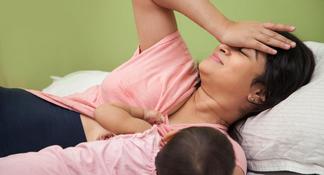
Wish to speak with a member of our team who is a certified lactation professional and also an experienced breastfeeding mother, click on this link.
Medical Advice Disclaimer
THIS WEBSITE DOES NOT PROVIDE MEDICAL ADVICE.
The information, including but not limited to, text, graphics, images and other material contained on this website are for informational purposes only. No material on this site is intended to be a substitute for professional medical advice, diagnosis or treatment. Always seek the advice of your physician or other qualified health care provider with any questions you may have regarding a medical condition or treatment before undertaking a new health care regimen, and never disregard professional medical advice or delay in seeking it because of something you have read on this website.
Disclaimer
We understand and acknowledge that parents and babies can be of various genders on a spectrum of LGBTQI+. Families come in diverse flavours. However, in our articles, for the sake of simplicity and convenience, we will be referring to the breastfeeding parent as the mother and using the female pronouns- ‘she’ and ‘her’ for babies. Babies can be nourished and nurtured in different ways and while we have used the terms breastfeeding and nursing, we recognize that parents can opt to chest feed or finger feed.
We don’t have conflicts of interest and declare, and we are compliant with the WHO code of marketing of breastmilk substitutes and the IMS act.
In case you find any information on this website that needs to be updated, please write to us at info@bsim.org.in

